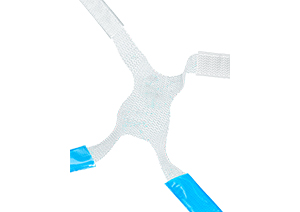
What is a Male Urethral Sling?
A male urethral sling is a surgery for treatment of stress urinary incontinence. Loss of urine unexpectedly with coughing, laughing, or other things that increase the pressure of the abdomen is called stress incontinence. A male urethral sling is a procedure to place a polypropylene mesh under the urethra to decrease or eliminate stress incontinence.
Why might I need a Male Urethral Sling?
The most common patient who has this procedure is a man with a history of radical prostatectomy or other, non-radiation, prostate treatment who has mild to moderate leakage of urine with coughs, sneezes, heavy lifting, or other activities that increase the abdominal pressure.
Men who consider placement of a urethral sling often are using pads, adult undergarments, or a clamp device to manage the leakage of their urine.
This procedure is not appropriate for men who have had radiation to treat prostate cancer.
Preparing for your Urethral Sling:
In general, preparation for a sling placement will involve the following steps:
- You will have bloodwork and other testing done at the hospital
- The hospital will call you to confirm arrival time and instructions
- You will be asked if you have allergies to medications, anesthesia, or latex.
- You should inform your doctor of any medications, vitamins, or supplements that you are taking.
- You should refrain from taking anti-inflammatories or blood-thinning medications a week prior to the procedure. Any blood thinning medications will be discussed with you and your doctors
- You may be asked to refrain from eating 8 hours prior to your scheduled arrival time and drinking 2 hours prior to your arrival time.
- You should remove all metal objects and accessories such as eyeglasses, jewelry, watch, etc. as they can interfere with the imaging technique used.
- You should arrange for someone to drive you home after the procedure.
What happens during placement of a Male Urethral Sling?
When you arrive at the hospital you will speak to an anesthesiologist who will discuss how they will make you comfortable for the procedure. This procedure is most commonly done with general anesthesia, but can be done with other forms. After you are asleep, your surgeon will place a nerve block to reduce your discomfort after the surgery. They will then make a single incision made in the perineum, the space behind your scrotum and in front of your anus. The sling is tunneled in front of your pubic bone and just inside your thigh. A cystoscopy will be performed during the surgery, first to confirm that your urethra is normal, and second to observe the improvement after the sling is placed. At the end of the surgery you will have a dressing in your scrotum. You will wake up in the recovery room.
Post-Operative Instructions
Activity
You should have only gentle activity during the first two weeks following your surgery. No heavy lifting, sexual activity, or strenuous exercise. After this period you can resume your normal activity.
Diet
You may eat a normal diet after the surgery as soon as you feel well enough to.
Bathing
You should not bathe for two full days after the surgery. You can sponge bathe, but avoid getting your incisions wet.
You will be sent pain medication after your procedure. Some patients will also be given antibiotics.
What can I expect after my Sling Placement?
You should expect an immediately improvement in your urine leakage. Most men see a significant improvement in their symptoms immediately, although not all men are fully dry after the procedure. Usually any pain and swelling improves within 1-2 weeks of the procedure and you will feel fully recovered within a month.
The sling is a permanent implant and usually improves symptoms for many years. Some men do notice worsening of symptoms years after the procedure, but this is not guaranteed.
What are the risks of a Male Urethral Sling Procedure?
All surgeries have risks. When you have a sling placed there is a risk of bleeding, although bleeding severe enough to require a blood transfusion is rare. Infection can occur, but is rare. Rarely men will have issues with mesh erosion. Other risks are associated to this surgery but are rare. Your surgeon can discuss these risks with you.
